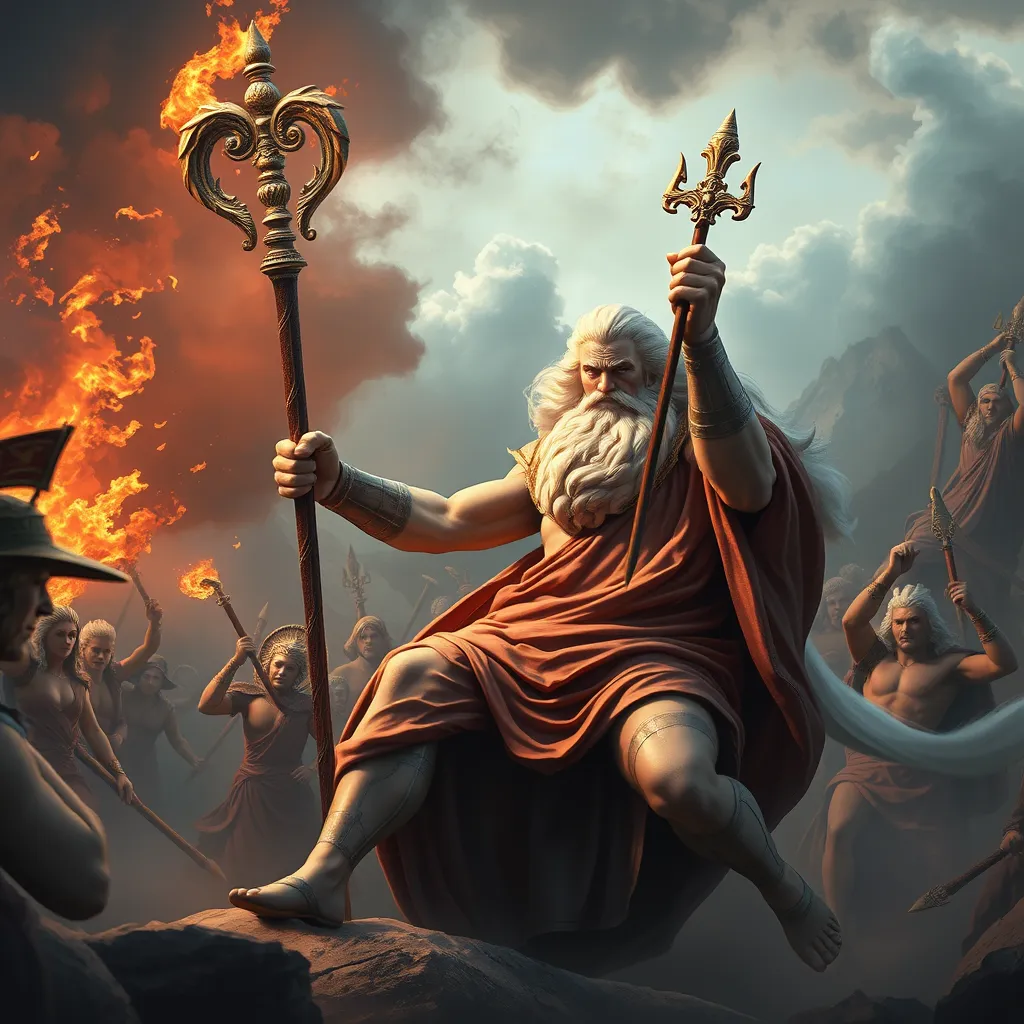The Role of Zeus in the Battle of the Gods: A Historical Perspective
I. Introduction
Greek mythology is a rich tapestry of tales that intertwine the lives of gods, heroes, and mortals. At the center of this pantheon stands Zeus, the king of the gods, who embodies power, authority, and justice. His significance in the mythological hierarchy is profound, as he is often seen as the ultimate arbiter in conflicts both divine and mortal.
This article aims to explore Zeus’s role in the epic conflicts known as the Battle of the Gods, shedding light on his leadership, strategies, and the complex relationships he maintained with other deities. Through this exploration, we will gain a deeper understanding of how Zeus’s actions shaped the narratives of Greek mythology.
II. The Origins of Zeus in Greek Mythology
Zeus was born to the Titans Cronus and Rhea on Mount Ida in Crete. According to myth, Cronus, fearing that one of his children would overthrow him, swallowed each of them at birth. However, Rhea managed to save Zeus by hiding him and giving Cronus a stone wrapped in swaddling clothes instead.
As Zeus grew, he orchestrated a plan to liberate his swallowed siblings—Hestia, Hera, Demeter, Poseidon, and Hades—from Cronus’s belly. With the help of the goddess Metis, he forced Cronus to regurgitate his siblings. This act of defiance marked the beginning of Zeus’s rise to power.
After freeing his siblings, Zeus led them in a ten-year war against Cronus and the Titans, known as the Titanomachy. This conflict culminated in the defeat of the Titans and the establishment of Zeus as the supreme ruler of the cosmos, solidifying his authority among the gods.
III. The Concept of the Battle of the Gods
The term “Battle of the Gods” refers to various conflicts among the deities in Greek mythology, where divine powers clash for supremacy and control. These battles are not merely physical confrontations but often represent deeper themes of chaos, order, and the struggle for power.
Key conflicts in Greek mythology include:
- The Titanomachy: The war against the Titans led by Zeus.
- The Gigantomachy: The battle between the Olympian gods and the Giants.
- The Trojan War: While primarily a conflict among mortals, the gods played significant roles, taking sides and influencing outcomes.
These battles carry mythological significance, often symbolizing the tension between chaos and order, and the eternal struggle for dominance among divine beings.
IV. Zeus’s Leadership and Strategic Role
Zeus’s leadership was characterized by his ability to mediate conflicts, not only among the gods but also between gods and mortals. His strategies often involved forming alliances and using his immense power judiciously.
Some of the most notable tactics and alliances included:
- Forging alliances with siblings like Poseidon and Hades, who helped him defeat the Titans.
- Negotiating with other deities during the Gigantomachy, where he played a decisive role in rallying the Olympians against the Giants.
- Intervening in the Trojan War, where he balanced the interests of various gods while favoring certain mortals.
In battles where Zeus played a pivotal role, his strategic decisions often determined the outcome, showcasing his position as the ultimate ruler of the gods.
V. The Relationship Between Zeus and Other Olympians
Zeus’s relationships with other Olympians were complex, involving both alliances and rivalries. His interactions with Hera, Poseidon, and Hades shaped many mythological narratives.
Key relationships include:
- Hera: As both his sister and wife, Hera’s jealousy often led to conflicts, yet they worked together to maintain order among the gods.
- Poseidon: Zeus and Poseidon shared a strong bond as brothers, yet they often clashed over their domains, particularly in their respective roles in the Trojan War.
- Hades: The ruler of the Underworld, Hades maintained a distant relationship with Zeus, often focusing on his realm while occasionally collaborating in the greater cosmic order.
These relationships significantly impacted the outcomes of divine battles, illustrating the intricate dynamics within the Olympian hierarchy.
VI. Cultural and Historical Interpretations of Zeus’s Role
Ancient Greeks viewed Zeus as a symbol of power and authority, particularly in the context of war. His ability to control thunder and lightning made him a formidable figure in both mythology and religion.
Artistic representations of Zeus in battles often depicted him as a majestic figure, commanding respect and fear. Various forms of art, including sculptures and pottery, illustrated Zeus wielding his thunderbolt, symbolizing his dominion over the heavens and earth.
The portrayal of Zeus was also influenced by historical events, such as wars or political changes in ancient Greece, further intertwining his image with the concept of leadership and power.
VII. The Legacy of Zeus in Literature and Art
Zeus has been a central figure in classical literature, appearing in works by Homer, Hesiod, and later playwrights. His character often embodies themes of justice, authority, and the consequences of hubris.
In modern culture, Zeus has influenced various interpretations and adaptations, appearing in films, literature, and even video games. The portrayal of Zeus has evolved, yet his essence as a powerful deity remains intact.
Contemporary discussions of mythology often reflect on Zeus’s role as a leader and a symbol of divine authority, illustrating the lasting impact of his character in both ancient and modern contexts.
VIII. Conclusion
In summary, Zeus’s significance in the Battle of the Gods is undeniable. His rise to power, strategic leadership, and complex relationships with other deities underscore his role as the ruler of the Olympian pantheon. The enduring legacy of Zeus in mythology reflects not only his importance in ancient Greek culture but also his relevance in contemporary discussions of power and authority.
As we explore the interplay between history and mythology, it becomes clear that Zeus remains a vital figure, representing the eternal struggle for dominance and order in the cosmos.




